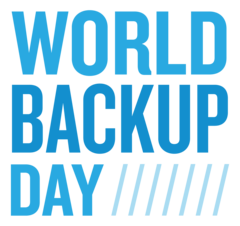World Backup Day is a commemorative date celebrated annually by the backup industry and tech industry all over the world on March 31.[1][2][3] It highlights the importance of protecting data and keeping systems and computers secure.
| World Backup Day | |
|---|---|
 Logo of the World Backup Day | |
| Official name | World Backup Day |
| Date | 31 March |
| Frequency | Annual |
| First time | 2011 |
| Related to | Data Privacy Day |
World Backup Day started with a post on Reddit where a user wrote about losing their hard drive and wishing someone had reminded them about how important it is to backup data. The campaign started by Ismail Jadun in 2011 and every year news outlets write articles about the importance of backing up data on World Backup Day.[4][5]
Observance
editEvery year on March 31, companies tweet and have podcasts[6] about the importance of backing up data to prevent data loss. On the website WorldBackupDay.com people can make a pledge in ten languages on various social media channels about the importance of backing up their data. The World Backup Day is recognized as National Calendar Day on many national holiday websites.[7][8]
References
edit- ^ Coberly, Cohen (31 March 2021). "World Backup Day is here – is your data secure?". Retrieved 31 March 2022.
- ^ Rompf, Marco (31 March 2022). "Backup? Aber sicher! Und der restore?". Retrieved 31 March 2022.
- ^ Barker, Ian (31 March 2022). "World Backup Day highlights the importance of keeping your data safe". Betanews. Retrieved 31 March 2022.
- ^ Misener, Dan (29 March 2016). "World Backup Day highlights importance of protecting data". CBC. Retrieved 31 March 2022.
- ^ Biersdorfer, J.D. (31 March 2017). "A Quick Guide to Backing Up Your Critical Data". The New York Times. Retrieved 31 March 2017.
- ^ Covey, Lou. "Guess what? Today is World backup day". Crucial Tech. Retrieved 2 September 2022 – via Apple Podcasts.
- ^ "National Calendar: World Backup Day". nationaldaycalendar.com. Retrieved 2 September 2022.
- ^ "National Today: World Backup Day". nationaltoday.com. 31 March 2020. Retrieved 2 September 2022.